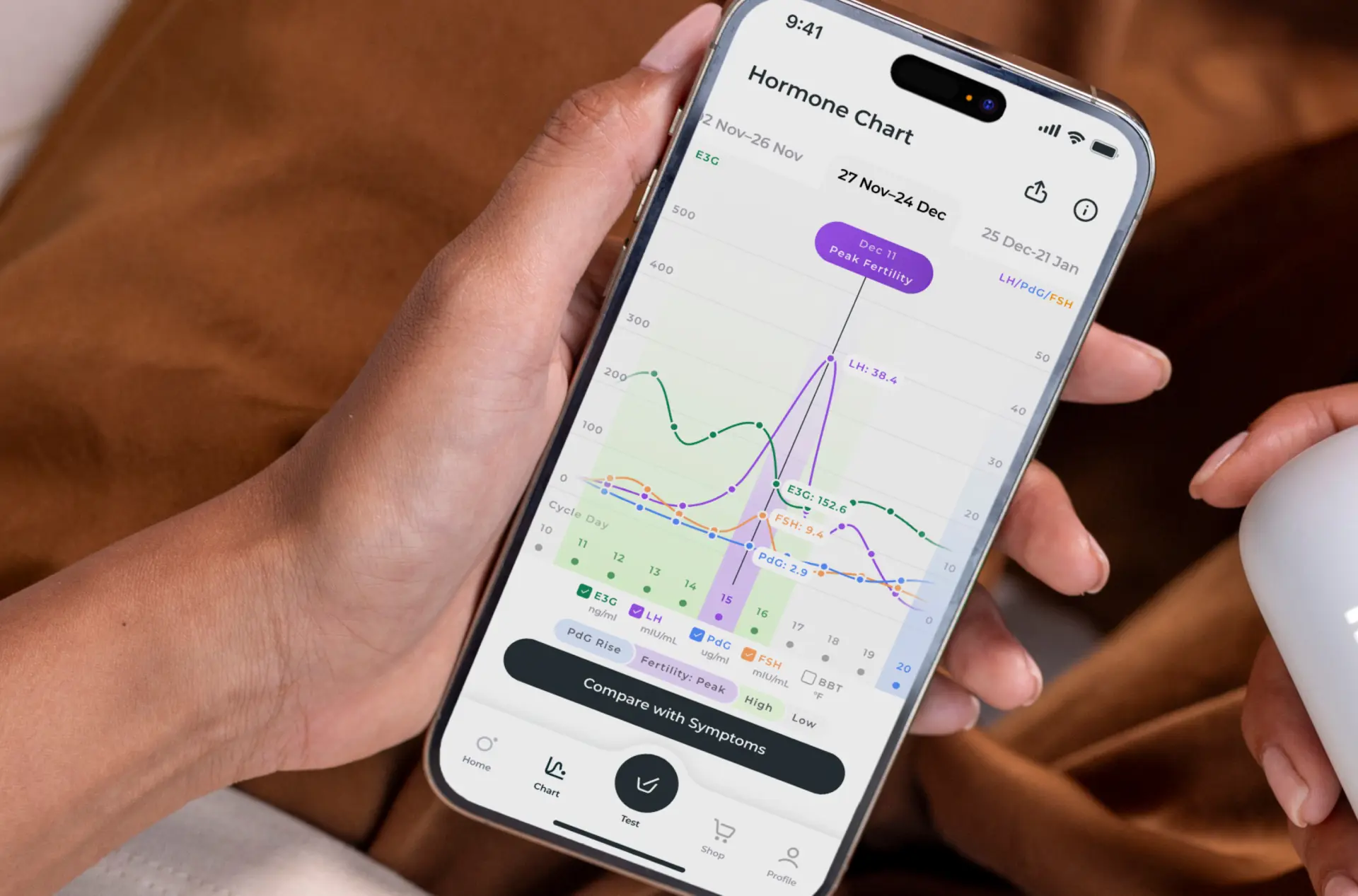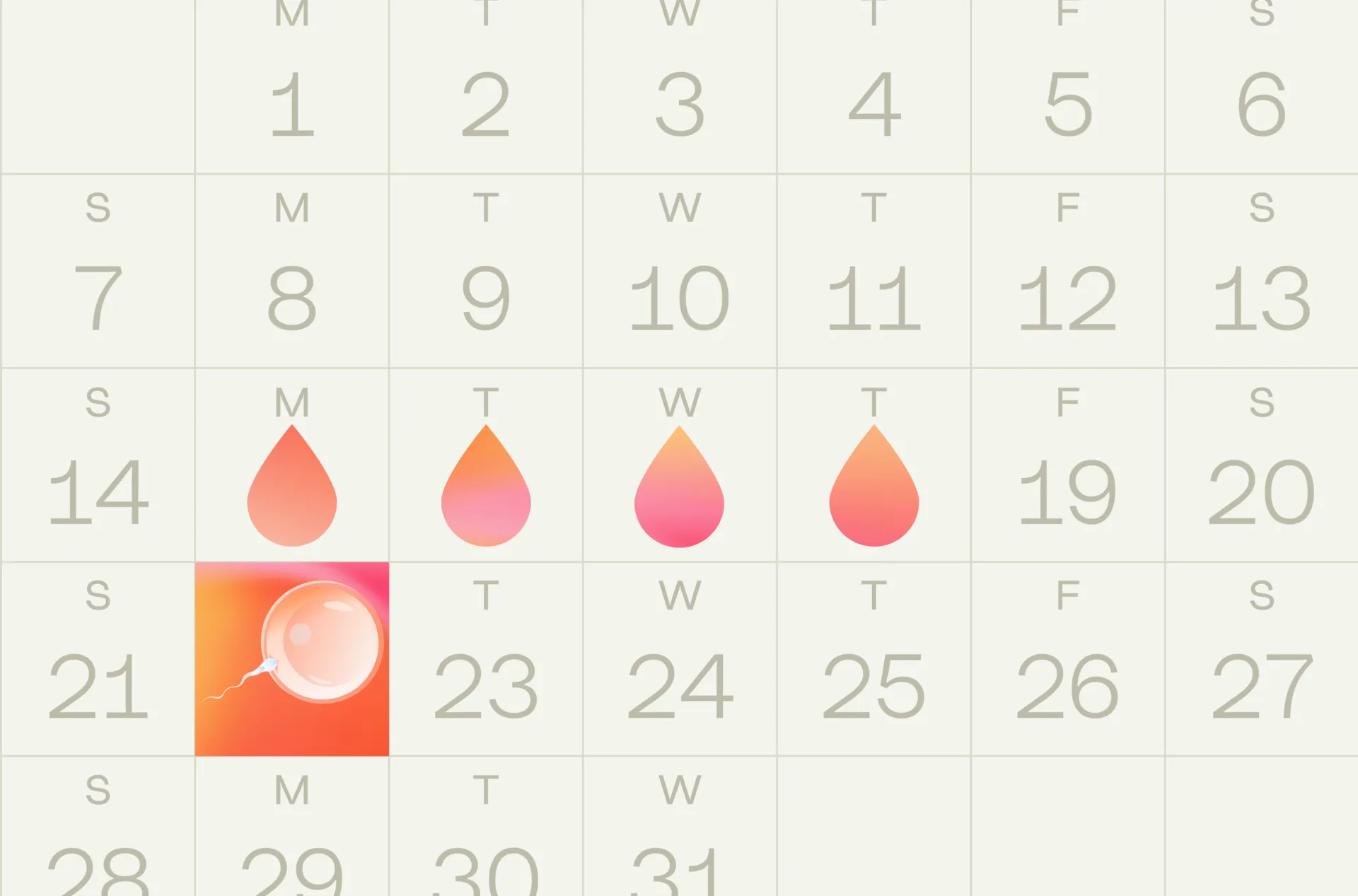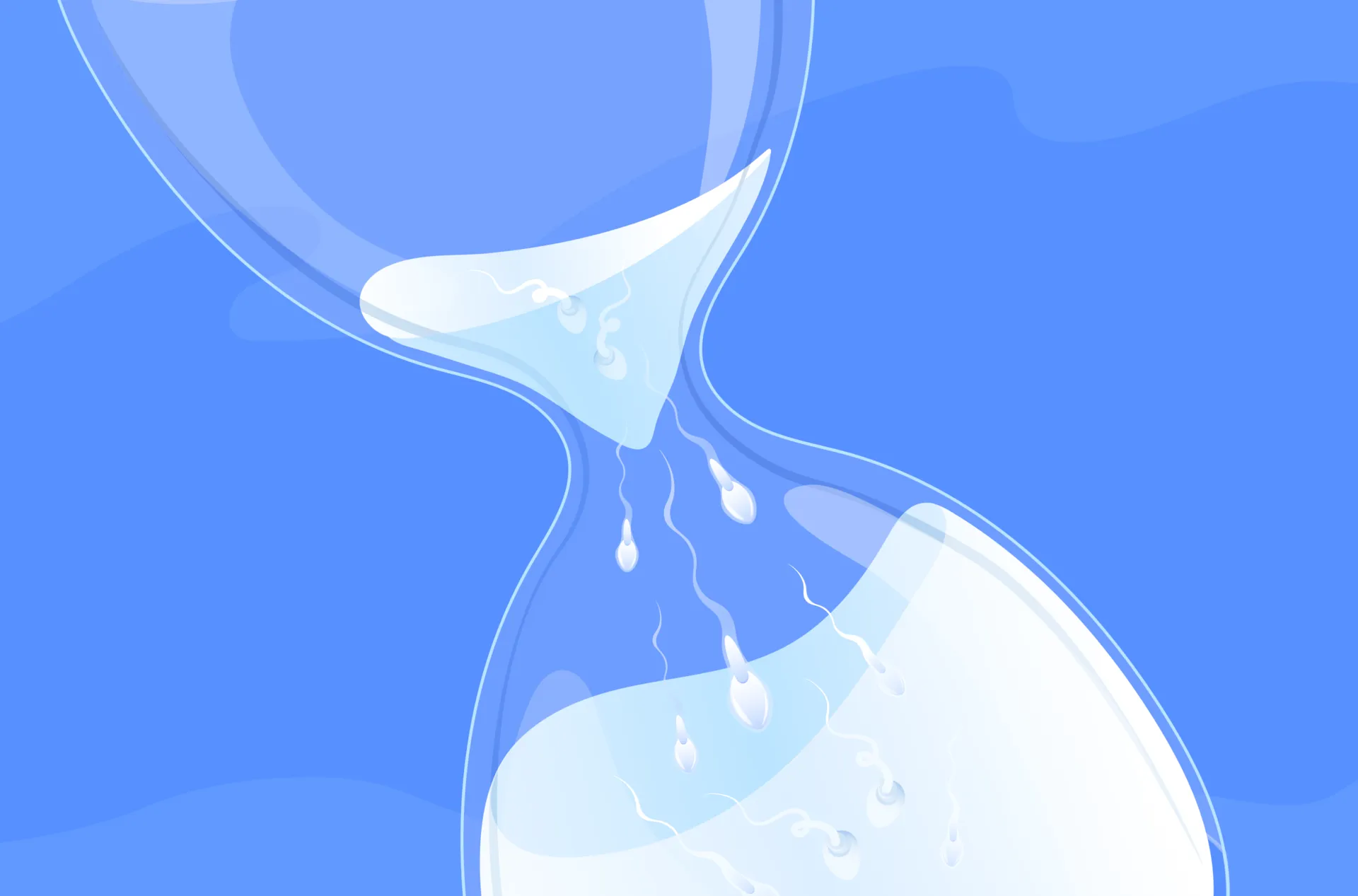Content table
Getting those familiar PMS symptoms, but your period is nowhere in sight?
We know it’s frustrating.
You’re probably wondering what’s going on and when (or if!) your period will show up.
This scenario can be especially confusing when those PMS symptoms mimic early pregnancy signs.
But don’t worry—we’re here to help you understand the signs of your period coming late and what might be causing them. (And to remind you to take a pregnancy test — if you think you may be pregnant, that’s the only way to confirm pregnancy.)
Key takeaways
- A normal period comes every 21-35 days. It usually lasts 2-8 days and has an average blood loss of 30 mL. It also doesn’t cause extreme pain, discomfort, or interference with day-to-day activities.
- There’s no exact definition of a late period. But if you have regular cycles and you’ve gone 7-9 days past your expected period date, it’s generally considered late.
- Missed or late period signs often mimic PMS symptoms. This includes cramps, bloating, discomfort, sleep disturbances, and mood swings.
- Common causes of late periods include: age, lifestyle changes, chronic diseases, hormonal conditions, medications, or a chemical pregnancy.
- Only a pregnancy test can confirm pregnancy.
- Always talk to your doctor if you have missed menses for more than three cycles or if your periods are consistently late.
What's a "Normal" Period?
Before we diving into late periods, let’s recap what a typical menstrual cycle looks like. Generally speaking, a normal period is one that:
- Comes regularly: You can expect it every 21 to 35 days.
- Lasts a reasonable amount of time: Bleeding typically lasts for 2 to 8 days.
- Isn’t excessively heavy: The average blood loss is around 30 mL (about 1 ounce).
- Doesn’t cause extreme pain: While some discomfort is normal, severe pain isn’t.
Now what about a delayed period? What constitutes a period being late?
There’s no one-size-fits-all answer. It’s all relative to your typical cycle.
Someone with a 21-day cycle might be worried if their period doesn’t come even on Cycle Day CD 30. But for someone with a 27-day cycle, this isn’t much of a concern yet.
If your cycles are usually pretty consistent and you haven’t gotten your period within 7 to 9 days of when you expect it, it’s considered late.
What Are the Signs of a Period Coming Late? What About Pregnancy Signs?
Signs of late periods are similar to the Premenstrual Syndrome (PMS) Symptoms you may experience during other cycles. These common signs include:
- Abdominal cramps
- Back pain
- Fatigue
- Breast tenderness
- Increased urination
- Food cravings
- Mood swings and irritability
- Acne
- Changes in sex drive
Many of these symptoms overlap with early pregnancy.
This is because both involve hormonal changes, particularly fluctuating progesterone levels.
So, how can you tell if the signs indicate a late period or early pregnancy?
Only a pregnancy test can definitively confirm pregnancy. However, some clues might help you distinguish between period and pregnancy symptoms. Let’s discuss.
Implantation bleeding
Around 15-25% of women experience implantation bleeding. This is a type of bleeding coincides with implantation, typically around 8 DPO and 10 DPO. It looks like a couple of pink or brownish blood/discharge spots.
Know more: Implantation Bleeding Vs. Periods: How to Distinguish?
Cramps
Period cramps come a few days before your period due to rising levels of prostaglandins (hormone-like chemicals that play a role in pain and inflammation). They vary in severity and last until your period comes.
And you’re most likely to feel them in the lower abdomen and back.
However, implant cramps usually come 8-10 DPO and last for 1-2 days. They’re milder, and the pain is a dull, aching, or twinging sensation in the lower abdomen and pelvic region.
Know more: What Do Implantation Cramps Feel Like?
Vaginal discharge
Your discharge can also be a clue to a delayed period and early pregnancy. If you’re not pregnant, your discharge will likely be thick, sticky, and scanty due to lower estrogen levels in the luteal phase. But in case of pregnancy, there’s usually an increase in the amount of discharge since estrogen levels are rising. However, discharge can be affected by various other factors and isn’t a reliable indicator.
Here’s a table to sum it all up –
Sign | Not Pregnant | Pregnant |
Implantation bleeding | None |
|
Cramps |
|
|
Vaginal discharge | Sticky, scanty | Increase in quantity (thanks to rising estrogen levels) |
Pregnancy test | Negative | Positive |
Know more: DPO Symptoms: Tracking Days 1 – 12 Past Ovulation
Why Is My Period Coming Late?
There are many reasons why your period might be delayed. Here are some of the most common reasons.
Age
Irregular cycles are more common at both the beginning and end of your reproductive years. These years are about the time of menarche and perimenopause.
This is because your body is still learning how to regulate its hormones during puberty. And hormone production starts to decline as you approach menopause.
Lifestyle changes
Significant shifts in your sleeping pattern, exercise routine, or eating habits can disrupt your cycle.
Extreme weight shifts, excessive exercise, or poor nutrition affect hormones like estrogen and progesterone. This can lead to irregular or absent periods.
Know more: Diet and Fertility: What to Avoid When Trying To Conceive
Stress
High stress levels can significantly influence your hormones.
When you’re stressed, your body releases cortisol. This hormone can interfere with the production of your reproductive hormones, specifically progesterone. So, the release of cortisol can disrupt ovulation and lead to late or missed periods.
Polycystic Ovary Syndrome (PCOS)
PCOS is a common cause of irregular cycles, characterized by an excess of male hormones (androgens). This leads to the development of cysts on the ovaries and irregular or absent ovulation.
This hormonal imbalance can cause a range of symptoms, including:
- Irregular or absent ovulation
- Excessive and unwanted hair growth
- Acne
- Weight gain or difficulty losing weight
- Fertility problems
Read more: Can You Get Pregnant with PCOS?
Thyroid conditions
The thyroid gland produces hormones that regulate metabolism and influence reproductive hormones. Both an overactive (hyperthyroidism) or an underactive thyroid (hypothyroidism) can affect the production, transport, and metabolism of estrogen and progesterone. The result? Irregular cycles.
Chemical pregnancy
Chemical pregnancy occurs when a fertilized egg implants but stops developing very early on. Around 8-33% of all pregnancies end up as chemical pregnancies, making it a common issue than many people think.
Anywhere from 8-33% of all pregnancies end up as chemical pregnancies.
It often appears as a late heavy period, and you might not even know you were pregnant. You’ll only know if you happened to take an early pregnancy test right after conception.
What Should You Do if You Have Period Symptoms but No Period?
If you’re experiencing period symptoms but no period and suspect you might be pregnant, wait at least a week (or even two) after your missed period before taking a test. This will give you the most accurate results.
Think about any other potential causes of a late period. These could include life pressure, lifestyle changes, or underlying health conditions.
Have you been under a lot of stress lately? Have you changed your dietary habits or exercise routine? Have you recently started any new medications?
Cycle tracking can also be beneficial here. You can track your cycles with a fertility monitor like Inito, which helps you predict and confirm ovulation. Inito measures four key fertility hormones – LH, estrogen, PdG (urine metabolite of progesterone), and FSH – on a single test strip. You can also log your symptoms on the Inito app, which can help you identify any patterns or trends.
Lastly, talk to a healthcare professional if:
- You’ve ruled out pregnancy
- Your cycles remain atypical or stop altogether for 3+ months
They can help determine the cause and recommend the appropriate treatment.
Your doctor may opt to:
- Perform a physical examination
- Order tests to check your hormone levels
- Recommend other diagnostic tests, like an ultrasound or endometrial biopsy
Read more: Period Symptoms But No Period

FAQs
While there’s no instant fix, here are a few things that might help nudge your period along:
- Healthy habits: Focus on a balanced diet and regular exercise.
- Herbal teas: Some find relief with herbal teas like chamomile or ginger.
- Warmth: A heating pad or warm bath might ease cramps and boost circulation.
- Unwind: Life’s pressures can mess with your cycle, so try relaxation techniques like deep breathing, yoga or meditation.
- Medication check: Talk to your healthcare professional about any meds that could be affecting your cycle.
If your period is consistently late or absent, see your doctor to rule out any underlying issues.
Delayed cycles can be annoying, but don’t worry just yet. Here’s what you should do:
- Take a pregnancy test: If you think you’re pregnant, do this first.
- Think back: Have you been stressed, changed your diet or exercise routine, or started new meds? These can all influence your cycle.
- Track it: Use Inito to monitor your cycle for any patterns.
- Talk to your doctor: If your period is consistently late, check with your healthcare professional.
If your period hasn’t arrived within 7-9 days of when you expect it, it’s considered late.
If you haven’t gotten your period within six weeks of its due date, that’s usually considered missed. Causes for a missed period include pregnancy, birth control, perimenopause, hormonal imbalances, or changes in lifestyle.
Missing a period here and there can be totally normal. Our cycles can be a bit unpredictable at times. Lots of things can throw it off, like anxiety, changes in routine, or even random hormonal fluctuations.
But if you’re regularly missing cycles, it’s always a good idea to talk to your healthcare professional.
There are many reasons why your period might be MIA.
Here are a few:
- Pregnancy
- Stress
- Weight changes
- Excessive exercise
- Medical conditions like PCOS or thyroid disorders
- Medications
This can occur when your ovaries release an egg later than usual in your menstrual cycle.
Why the delay? For much of the same reasons as why your period may be late. It could also be due to breastfeeding, perimenopause, or early menopause.
Sex itself doesn’t directly delay your period.
However, it’s a bit more nuanced than that. If you have unprotected sex and become pregnant, that will definitely affect your period (you won’t get one!). Also, some sexually transmitted infections (STIs) can cause inflammation or other complications that might mess with your cycle.
Know more: Can Sex Delay Your Period?
Yes! Being sick can definitely throw your menstrual periods a curveball.
When you’re under the weather, your body releases cortisol. And those can interfere with the delicate balance of hormones that regulate your menstrual cycle.
A UTI can directly cause a late period. Infections lead to inflammation and stress which can indirectly influence your cycle.
Know more: If I Get a UTI, Will It Delay My Period?
Getting your period twice a month could be happening due to a few reasons:
- Shorter cycles: Some people naturally have shorter menstrual cycles, around 21 days or less. If that’s the case, it’s possible to get your period twice within a typical month
- Ovulation bleeding: Sometimes you might experience light bleeding or spotting during this time of your cycle. This can be mistaken for menstrual periods. This usually happens around 12-14 days before your expected period.
- Hormonal imbalances: Conditions like PCOS or thyroid disorders can mess with your hormones and lead to atypical cycles. This can include getting your period more frequently.
- Fibroids or polyps: These growths in the uterus can sometimes cause abnormal bleeding, including between menstrual periods.
- Perimenopause: As you approach menopause, your cycles can become irregular and unpredictable. That can sometimes mean more frequent cycles.
Here are a few reasons why you might but spotting but there’s no period in sight.
- Ovulation bleeding
- Implantation bleeding
- Changes in birth control
- Lifestyle changes
- Other causes: Less common causes of spotting include cervical polyps, fibroids, or certain infections.
Absolutely! Stress can play a major role in your period.
When you’re anxious, your body releases cortisol. This hormone is helpful in small doses, but when you’re constantly stressed, high cortisol levels can interfere with the production of hormones. This includes the ones that regulate your menstrual cycle.
Was this article helpful?
- The Normal Menstrual Cycle and the Control of Ovulation
- Overview: Heavy Periods
- The Impact of Irregular Menstruation on Health: A Review of the Literature
- Menstrual disturbances and its association with sleep disturbances: a systematic review
- Chronic Stress and Ovulatory Dysfunction: Implications in Times of COVID-19
- Polycystic Ovary Syndrome
- Antidepressants and menstruation disorders in women: a cross-sectional study in three centers
- Menses resumption after cancer treatment-induced amenorrhea occurs early or not at all
- Etiological evaluation of repeated biochemical pregnancy in infertile couples who have undergone in vitro fertilization
- Pregnancy
- Association between Body Weight Changes and Menstrual Irregularity: The Korea National Health and Nutrition Examination Survey 2010 to 2012












